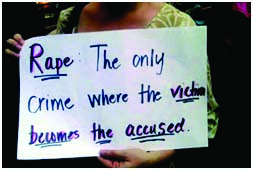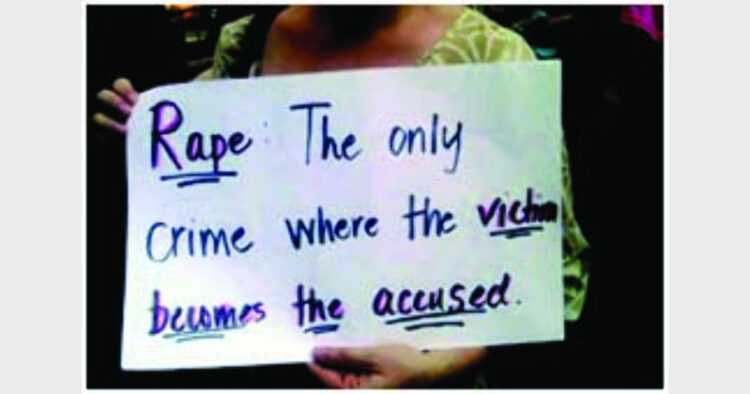Dr JS Rajput
 Exactly three months after December 16, 2012, India seethes in anger and anguish as reports appear of another case of unimaginable cruelty inflicted upon an innocent girl child. One shivers to witness what is presented by the electronic media. The system of governance could not create any impact even after JS Verma Committee Report, and the follow-up legislation. Practically every day media reports several instances of cruelty and humiliation being inflicted on girls and women.
Exactly three months after December 16, 2012, India seethes in anger and anguish as reports appear of another case of unimaginable cruelty inflicted upon an innocent girl child. One shivers to witness what is presented by the electronic media. The system of governance could not create any impact even after JS Verma Committee Report, and the follow-up legislation. Practically every day media reports several instances of cruelty and humiliation being inflicted on girls and women.
Not only this, the ‘brave’ ACP of Delhi police slaps a protesting young girl thrice with impunity and arrogance. He makes it very clear to the citizens what a rogue police force the Country has been blessed with. The man has just been suspended, neither dismissed nor put behind bars. Rest assured, he shall be back shortly and continue to get his promotions in due course. Who will give justice to this girl? The government of India has not yet told the nation how shall they restore her dignity? Not many may recall the description of India’s police force as the most organized gang of dacoits recorded by late Justice Anand Naraian Mulla of the Allahabad High Court a couple of decades ago. It is now more organized, secure and beyond control. The Commissioner of police Delhi is all appreciation for his force. The central government just cannot dare to touch the Commissioner! When the prime minister, the law minister, the coal minister just do not show even an acquaintance with the concept of moral responsibility, the Police personnel including the Commissioner have nothing to worry about. Indian police has a reputation amongst people and everyone knows about it. People avoid even helping a road accident victim because they don’t trust Indian police. Find out why and who forces such an inhuman response even from concerned citizens?
India’s freedom struggle was fought based on values and principles. Those in power claim vociferously to be sole inheritors of Gandhian legacy. In reality, they have negated every human and democratic value in public life. When corruption is rampant at the top, it is futile to expect adherence to values and honest performance of duties from others. Only those who are on high moral ground in words and deeds are eligible to initiate such a process of attitudinal transformation which is tough to achieve but not an impossibility. Gender justice shall remain elusive till the system of governance is fully and totally committed to values and sincerely performs the assigned tasks. The problem is to create a functional system that is equipped in skills and attitudes to serve the people. There is no way out than to ensure serious efforts to teach fundamental duties to citizens and official functionaries without delay. Focus must shift to Article 51-A of the Constitution of India. This has to be simultaneously assisted by shaming politicians who are flouting every value in public life and yet succeed in remaining in public life because of ill gotten wealth and muscle power.
A long term strategy for attitudinal change and value inculcation has to be delineated fast. It is time to recall the recommendations of another Committee headed by Justice JS Verma “to operationalise the suggestions to teach fundamental duties to the citizens of the country” is also simultaneously taken up for sincere implementation. This committee, appointed by the government of India on July 1998, included stalwarts held in highest esteem by the people of India: Dr. Karan Singh, Dr. LM Singwi and Dr. Subhash Kashyap. A letter written by Former Chief Justice of India Justice Rangnath Misra was treated as a writ petition and the Supreme Court of India issued notice to the union of India and others, resulting in the constitution of this committee. It is relevant to recall the concern that was presented before the highest court of the country: “all of us are experiencing to our horror degrading human behavior in society every day. The deterioration is gradually becoming sharper and unless this fall is immediately arrested and a remedial measure found out and enforced, the situation would not improve… Fundamental duties have remained in the Constitution book and have not come out to reach even the class of people who handle the Constitution.” The Writ further stated that: “The Constitution within a quarter of a century brought about a right oriented society. The Indian approach of ensuring rights through performance of one’s duties was totally abandoned. The 42nd amendment brought in the Chapter IVA entitled Fundamental Duties Article 51-A in its ten clauses (now eleven) cover several – nay all material – aspects lack of which has been responsible for today’s evils. If the Society becomes duty-based, everyone in India should turn attention on performance of duties and through such performance ensure and be entitled to the rights of a citizen.”
It was suggested in the Writ that “as a nation building measure, teaching Fundamental Duties in every educational institution and as a measure of in-service training everywhere’ is necessary. Justice Misra also informed the Court that this Duty orientation “cannot be inculcated in our citizens unless these are brought into their minds and living process through teaching and education”. Article 51-A was introduced in the Constitution during emergency. The government that came after Emergency did not alter anything in it. It was clear that the nation was experiencing the painful pangs of neglect of basic duties of citizens practically in every sphere of life and activity. It is worthwhile to recall the following duty contained in the Article 51A (e) which specifically refers to gender discrimination: “To promote harmony and the spirit of common brotherhood amongst all the people of India transcending religious, linguistic and regional or sectional diversities: to renounce practices derogatory to the dignity of women”.
This Committee was guided by the basic principle mentioned in a letter written by Gandhi Ji to the then Director General of the UNESCO, Julian Huxley, who was busy drafting the Universal Declaration of Human Rights Charter:“I learnt from my illiterate but wise mother that all rights to be deserved and preserved come from duty well done. Thus the very right to live accrues to us when we do the duty of the citizenship of the world. From this one fundamental statement, perhaps it is easy enough to define duties of men and women and correlate every right to some corresponding duty to be first performed…”
This one statement has no parallel in strength and potential when it comes to human rights and human duties. The Committee printed it prominently on one full page of its report. On gender bias the following specific recommendation was made: “In order to ensure the dignity of women gender biases and sex-stereotyping must be eliminated from all school and college textbooks and this should be given as a mandate to all curriculum development agencies, both at national and state levels.”
The Committee made very specific recommendations under the title “People’s Representatives from Panchayats to Parliament”. It recommended special programmes for parliamentary and state assembly levels to make the elected representatives aware of the fundamental duties and the need for each one of them to internalize and put to practice each one of these. It should percolate to corporations and Panchayat levels equally seriously. The Committee made very specific recommendations on how to impact public administration and civil servants, business and Industry and media.”
Urgent action on these recommendations on duties shall pave the way desired social transformation. It would also be a fitting tribute to Justice JS Verma for his pioneering contributions.
(The writer is a well-known educationist who was awarded the Jan Amos Comenius Medal by UNESCO for outstanding contributions in research and innovations.)














Comments